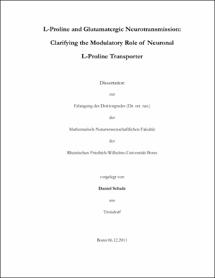L-Proline and Glutamatergic NeurotransmissionClarifying the Modulatory Role of Neuronal L-Proline Transporter

L-Proline and Glutamatergic Neurotransmission
Clarifying the Modulatory Role of Neuronal L-Proline Transporter

| dc.contributor.advisor | Kostenis, Evi | |
| dc.contributor.author | Schulz, Daniel | |
| dc.date.accessioned | 2020-04-17T22:30:19Z | |
| dc.date.available | 2020-04-17T22:30:19Z | |
| dc.date.issued | 20.06.2012 | |
| dc.identifier.uri | https://hdl.handle.net/20.500.11811/5320 | |
| dc.description.abstract | The neuronal high affinity L-proline transporter (PROT) is a putative neurotransmitter transporter whose contribution to neurotransmission is still unknown. PROT is expressed exclusively in brain by subpopulations of glutamatergic neurons and is assumed to conduct the reuptake of L-proline, which is released upon depolarization. Since to date no specific high-affinity receptor for L-proline has been discovered, the amino acid has been suggested to play a role regulating glutamatergic neurotransmission. To uncover the in vivo modulatory function of PROT, a mouse strain lacking functional PROT was generated and confirmed. The analysis of these PROT-knockout mice provided new insights into the modulatory functional roles of this transporter. Biochemical alterations within the central nervous system of PROT lacking mice were identified. Thus, PROT-deficient mice exhibit increased expression levels of N-methyl-D-aspartic acid (NMDA), α-amino-3-hydroxy-5 methylisoxazolepropionic acid (AMPA) and kainate (KA) receptor subunits. Furthermore, levels of the dopamine receptor D2 (DRD2) as well as levels of the dopamine synthesizing enzyme tyrosine hydroxylase (TH) are elevated. Behavioral analyses of PROT-knockout mice unveiled decreased locomotor activity, increased anxiety like behavior, and better learning abilities compared to wild-type littermates. The changes in behavioral profiles of analyzed PROT-deficient animals are in line with the observed biochemical adaptive alterations. Collectively, the presented studies indicate that the functional role of PROT within neurotransmission is primarily the modulatory fine tuning of glutamatergic signaling, by controlling the levels of L-proline in synaptic clefts. | en |
| dc.language.iso | eng | |
| dc.rights | In Copyright | |
| dc.rights.uri | http://rightsstatements.org/vocab/InC/1.0/ | |
| dc.subject.ddc | 500 Naturwissenschaften | |
| dc.title | L-Proline and Glutamatergic Neurotransmission | |
| dc.title.alternative | Clarifying the Modulatory Role of Neuronal L-Proline Transporter | |
| dc.type | Dissertation oder Habilitation | |
| dc.publisher.name | Universitäts- und Landesbibliothek Bonn | |
| dc.publisher.location | Bonn | |
| dc.rights.accessRights | openAccess | |
| dc.identifier.urn | https://nbn-resolving.org/urn:nbn:de:hbz:5n-28808 | |
| ulbbn.pubtype | Erstveröffentlichung | |
| ulbbnediss.affiliation.name | Rheinische Friedrich-Wilhelms-Universität Bonn | |
| ulbbnediss.affiliation.location | Bonn | |
| ulbbnediss.thesis.level | Dissertation | |
| ulbbnediss.dissID | 2880 | |
| ulbbnediss.date.accepted | 26.03.2012 | |
| ulbbnediss.fakultaet | Mathematisch-Naturwissenschaftliche Fakultät | |
| dc.contributor.coReferee | Mohr, Klaus |
Files in this item
This item appears in the following Collection(s)
-
E-Dissertationen (4470)




